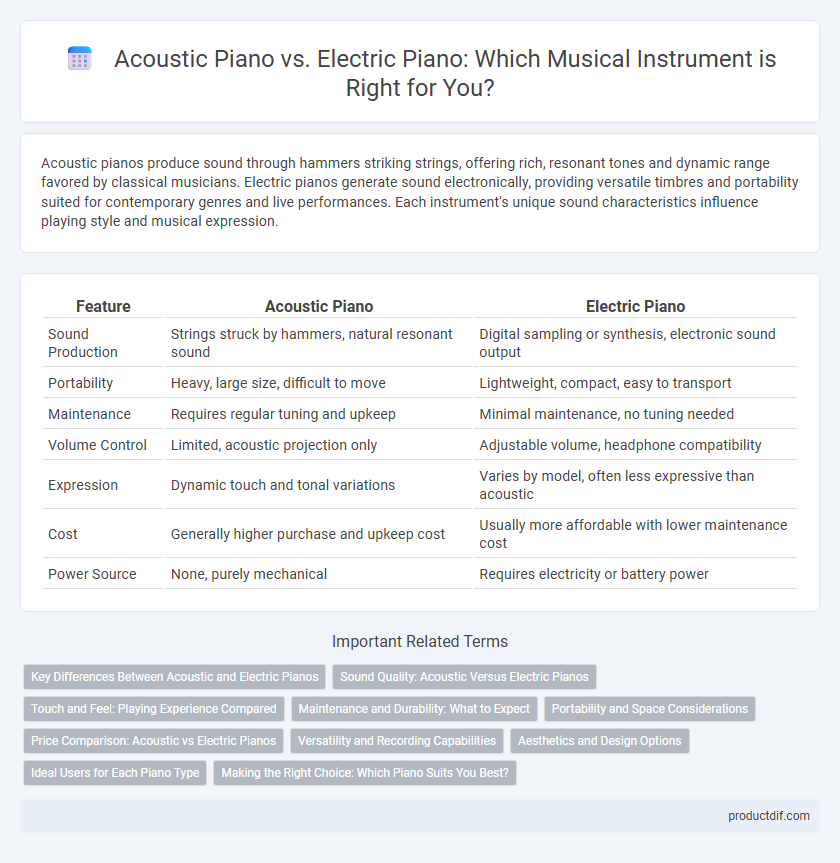Acoustic pianos produce sound through hammers striking strings, offering rich, resonant tones and dynamic range favored by classical musicians. Electric pianos generate sound electronically, providing versatile timbres and portability suited for contemporary genres and live performances. Each instrument's unique sound characteristics influence playing style and musical expression.
Table of Comparison
| Feature | Acoustic Piano | Electric Piano |
|---|---|---|
| Sound Production | Strings struck by hammers, natural resonant sound | Digital sampling or synthesis, electronic sound output |
| Portability | Heavy, large size, difficult to move | Lightweight, compact, easy to transport |
| Maintenance | Requires regular tuning and upkeep | Minimal maintenance, no tuning needed |
| Volume Control | Limited, acoustic projection only | Adjustable volume, headphone compatibility |
| Expression | Dynamic touch and tonal variations | Varies by model, often less expressive than acoustic |
| Cost | Generally higher purchase and upkeep cost | Usually more affordable with lower maintenance cost |
| Power Source | None, purely mechanical | Requires electricity or battery power |
Key Differences Between Acoustic and Electric Pianos
Acoustic pianos produce sound through hammers striking strings, resulting in a rich, resonant tone with natural sustain and dynamic range. Electric pianos generate sound electronically or via pickups, offering a variety of tones, volume control, and portability without the need for tuning or regular maintenance. Key differences include sound production methods, tactile response, maintenance requirements, and versatility in sound customization.
Sound Quality: Acoustic Versus Electric Pianos
Acoustic pianos produce rich, resonant tones through hammers striking strings, offering dynamic nuance and organic warmth unmatched by electric pianos. Electric pianos rely on electronic sound generation or sampling, which can replicate piano timbres but often lack the depth and complexity of acoustic sound waves. Musicians seeking authentic sound quality typically prefer acoustic pianos for their expressive tonal range and natural resonance.
Touch and Feel: Playing Experience Compared
Acoustic pianos provide a tactile response through weighted keys and hammer action, creating dynamic sensitivity that closely mimics the nuances of sound production. Electric pianos often feature graded or semi-weighted keys with adjustable touch sensitivity, offering versatility but a less authentic mechanical feel compared to acoustic models. Pianists seeking expressive control and traditional playing experience typically prefer the acoustic piano's natural key resistance and sound feedback.
Maintenance and Durability: What to Expect
Acoustic pianos require regular tuning, humidity control, and occasional string replacement to maintain sound quality, with wooden components susceptible to environmental damage. Electric pianos offer lower maintenance demands, as they do not need tuning and are less affected by humidity or temperature changes, enhancing long-term durability. Investing in an acoustic piano entails ongoing care costs, while electric pianos provide a more resilient and user-friendly option for sustained performance.
Portability and Space Considerations
Acoustic pianos are bulky, heavy, and require significant space, often needing dedicated rooms or large areas for placement, limiting portability and easy relocation. Electric pianos are compact, lightweight, and designed for mobility, making them ideal for small apartments, stage performances, and frequent transport. Choosing between them depends on space availability and the need for portability, with electric pianos offering greater flexibility for limited spaces.
Price Comparison: Acoustic vs Electric Pianos
Acoustic pianos typically range from $3,000 to $15,000 for entry-level to mid-range models, with high-end grand pianos exceeding $50,000, while electric pianos offer a more affordable price range from $500 to $3,000 depending on features and brand. Maintenance costs for acoustic pianos, including tuning and repairs, add to the long-term investment, whereas electric pianos require minimal upkeep and no regular tuning. The price difference reflects the acoustic piano's craftsmanship and sound authenticity versus the electric piano's portability and versatility.
Versatility and Recording Capabilities
Acoustic pianos offer rich, dynamic sound ideal for classical and jazz performances but have limited recording capabilities without external microphones. Electric pianos provide extensive versatility through adjustable tones and built-in effects, simplifying the recording process via direct audio output into digital workstations. Musicians seeking flexibility and seamless integration with modern production tools often prefer electric pianos for studio environments.
Aesthetics and Design Options
Acoustic pianos exhibit classic craftsmanship with rich wooden finishes, ornate details, and a traditional grand or upright shape, making them elegant centerpieces in any room. Electric pianos offer sleek, modern designs with compact, lightweight frames and a variety of customizable colors and finishes, suited for contemporary spaces and portability. Both instruments present diverse aesthetic choices, catering to different stylistic preferences and functional needs in home or stage environments.
Ideal Users for Each Piano Type
Acoustic pianos are ideal for classical pianists, educators, and professional musicians who prioritize authentic sound quality and dynamic touch sensitivity, often used in concert halls and recording studios. Electric pianos suit beginners, hobbyists, and electronic music producers needing portability, volume control, and versatile sound effects for home practice or live performances. Each type caters to different skill levels and usage environments, with acoustic pianos favored for traditional settings and electric pianos preferred for modern versatility.
Making the Right Choice: Which Piano Suits You Best?
Choosing between an acoustic piano and an electric piano depends on your sound preference, space availability, and budget. Acoustic pianos offer rich, authentic tones and dynamic expression ideal for classical and jazz musicians, while electric pianos provide versatility, volume control, and portability suited for practice and modern genres. Evaluating your musical goals and environment ensures selecting the piano that enhances your playing experience and creativity.
Acoustic piano vs Electric piano Infographic

 productdif.com
productdif.com